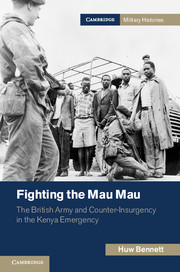Book contents
- Frontmatter
- Contents
- Maps
- Abbreviations
- Acknowledgements
- Introduction
- 1 ‘A determined campaign against the terrorist bands’
- 2 ‘Harmonious relations’: soldiers, civilians and committees
- 3 ‘Possibly restrictive to the operations’: marginalising international law in colonial rebellions
- 4 ‘The degree of force necessary’: British traditions in countering colonial rebellions
- 5 ‘Restraint backed by good discipline’
- 6 ‘A dead man cannot talk’: the need for restraint
- 7 ‘A lot of indiscriminate shooting’: military repression before Erskine's arrival
- 8 ‘Severe repressive measures’: the army under Erskine
- 9 ‘An essential part of the campaign’: civil-military alliances
- Conclusion
- Bibliography
- Index
- References
4 - ‘The degree of force necessary’: British traditions in countering colonial rebellions
Published online by Cambridge University Press: 05 December 2012
- Frontmatter
- Contents
- Maps
- Abbreviations
- Acknowledgements
- Introduction
- 1 ‘A determined campaign against the terrorist bands’
- 2 ‘Harmonious relations’: soldiers, civilians and committees
- 3 ‘Possibly restrictive to the operations’: marginalising international law in colonial rebellions
- 4 ‘The degree of force necessary’: British traditions in countering colonial rebellions
- 5 ‘Restraint backed by good discipline’
- 6 ‘A dead man cannot talk’: the need for restraint
- 7 ‘A lot of indiscriminate shooting’: military repression before Erskine's arrival
- 8 ‘Severe repressive measures’: the army under Erskine
- 9 ‘An essential part of the campaign’: civil-military alliances
- Conclusion
- Bibliography
- Index
- References
Summary
International law bestowed few protections on those caught up in the British Empire's decolonisation wars. Yet some vestiges of restraint remained, an achievement normally attributed to the British ‘minimum force’ principle. After exploring what minimum force was and what it was supposed to achieve, this chapter presents a sustained critique. The concept is far from unique to Britain, and while an irresolvable debate about which came first is avoided, we should at least recognise co-existence with international law. The notion of minimum force stemming from national characteristics is rejected on the grounds that such claims constitute little more than romantic self-delusion.
Minimum force is better perceived as an organisational norm, but one perhaps less central or benign than sometimes thought. In conceptual terms, minimum force is less constraining to soldiers than advocates believe, as it replicates the international norm of Kriegsraison in granting virtually any action ex post facto legitimation. Instead of dominating how British military behaviour in small wars is studied, minimum force should be given equal prominence with the phenomenon of exemplary force. Because the army disliked abstract thought and soldiers derived their conceptual understanding from actual practice, we must examine practice as much as doctrine. For this reason, the chapter provides a concise overview of military operations from the beginning of the twentieth century to 1952. It examines how thinking about the use of force developed, and how in practice the notion of exemplary force often proved important. These years constituted the organisation's immediate tradition, from which lessons about the legally permissible application of force in counter-insurgency situations were derived.
- Type
- Chapter
- Information
- Fighting the Mau MauThe British Army and Counter-Insurgency in the Kenya Emergency, pp. 83 - 107Publisher: Cambridge University PressPrint publication year: 2012



